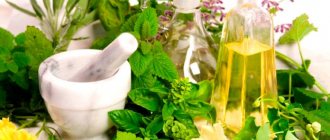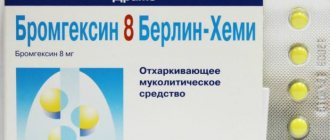Waiting for a baby to appear is always associated with numerous restrictions; you should also take mint tea during pregnancy with caution. Abuse of this drink can lead to a number of problems that an expectant mother should not experience. Pregnant women should drink mint tea in measured quantities and provided there are no contraindications.
Benefits of drinking mint tea during pregnancy
Many expectant mothers are interested in the question: can pregnant women drink mint tea? If a woman expecting a small miracle does not have certain contraindications, then she can drink this herbal tea in moderate quantities (1-2 cups per day).
Mint tea during pregnancy is valuable because:
- It helps eliminate constipation and bloating, prevents heartburn or alleviates its symptoms, and normalizes the digestive process. This is an important property of herbal tea, because Pregnant women often encounter digestive problems and stool disorders.
- It calms and improves sleep. Throughout pregnancy, a woman often experiences nervous tension. She worries about the condition of the child, the birth process, and is simply irritable. The emotional sensations of the expectant mother are transmitted to the baby. Therefore, it is very important for her to remain calm and get good sleep during pregnancy. Peppermint tea helps cope with these problems perfectly.
- It strengthens the immune system, fights colds, and helps with sore throat. During the period of bearing a child, tea with mint acquires special significance, because... Most medications are prohibited for expectant mothers. Taking a mint drink can be a good prevention of colds.
- It normalizes blood pressure in hypertension. Peppermint tea dilates blood vessels, bringing high blood pressure back to normal. This is an important property for expectant mothers suffering from hypertension.
Mint and tea made from it are valuable products for the body, so they are loved not only by pregnant women, but also by other categories of people. About the beneficial properties of mint in the following video:
https://www.youtube.com/watch?v=cWUMH8X_3Rk
The benefits and harms of mint during pregnancy
Mint has an anti-inflammatory, analgesic, diuretic, antiseptic, sedative and vasodilating effect on the human body. It helps restore strength, normalize the condition of nervous disorders and increased anxiety, and gets rid of pathogenic bacteria in the stomach.
A pleasant feature of mint is its ability to improve skin condition. Infusions from this plant can be used to combat acne and age spots on the face, which often appear in expectant mothers, as well as to prevent them. Read more about treating skin rashes during pregnancy→
Due to its properties, peppermint is used during pregnancy with the approval of the attending physician for the following conditions:
- insomnia;
- chronic gastritis;
- vomiting and nausea due to toxicosis;
- tendency to edema;
- constipation and flatulence;
- increased excitability.
A side effect of consuming large amounts of mint can be uterine hypertonicity, creating a risk of premature birth or miscarriage. The plant can also cause an allergic reaction.
Separately, it is worth mentioning the essential oil made from mint. The concentration of the active substance (menthol) in it is too high, which increases the risk of unwanted effects when using it. For this reason, the oil is strictly prohibited for pregnant women.
Possible harm and contraindications for pregnant women
We recommend reading an interesting article about the possible harm and benefits of mint tea for women. In order for pregnant women to drink mint tea safely, the following should be excluded:
- Hypotension. Women with low blood pressure will have to stop drinking this drink. Peppermint tea lowers blood pressure.
- Risk of miscarriage, uterine hypertonicity.
- Phlebeurysm.
- Diseases of the kidneys, gall bladder (presence of stones). Mint tea has diuretic and choleretic effects. If there are stones in the organs, herbal tea can lead to their displacement. This process is very painful, sometimes it requires surgical intervention, which is extremely undesirable and dangerous for women, within whom a new life is developing.
- Allergy to mint. If the expectant mother is prone to allergic reactions, the mint drink must be used very carefully or you will have to abandon it altogether.
Mint - beneficial properties during gestation
Mint belongs to the class of medicinal plants, as it can have a beneficial effect on the body as a whole, as well as cure a number of diseases. The entire above-ground part of the plant, which is cut off during the flowering period, exhibits healing properties. At this moment, the leaves and inflorescences are especially rich in essential oils, which provide a persistent and fragrant mint aroma.
Ancient tribes used the analgesic and sedative properties of mint. Dried mint inflorescences were taken internally as a decoction, as well as in the form of lotions and rubs for external use. Scientists and philosophers wore mint wreaths on their heads for clarity of mind and vigor. And in the halls where feasts were held, mint brooms were hung to lift the mood.
Mint received its interesting name in honor of a nymph named Minthe. Greek mythology says that the underground god Hades fell in love with her. But when his wife Persephone found out about this, she turned the young beauty into a plant. The only way Hades could help his beloved was to give her a charming aroma.
There are several varieties of mint that are used for consumption - spearmint, lemon and wild. But the most commonly used is peppermint. It has the most intense aroma and taste.
Peppermint during pregnancy is used for many diseases and serves as an excellent alternative to chemical drugs. The positive effect of mint on women's health is due to its rich chemical composition. In addition to essential oils, phenols and bitterness, the plant contains the following nutrients:
- Alimentary fiber.
- Vitamin complex (A, C, PP, all B vitamins).
- Macroelements (phosphorus, potassium, sodium, calcium).
- Microelements (manganese, zinc, strontium, iron, copper).
- Amino acids (tryptophan, arginine, lysine, phenylalanine, glycine).
- Sterols.
- Fatty acid.
- Tannins.
Mint has a positive effect on pregnancy. But uncontrolled use of medicinal herbs during gestation is unacceptable. Therefore, you should drink mint during pregnancy only on the recommendation of a doctor.
Now, let's get acquainted with the medicinal properties of mint, which are widely used by women during pregnancy and after it. So, mint has proven itself to be excellent for the following diseases:
- Cold. Mint has the ability to relieve pain, destroy germs and induce sweating no worse than pharmaceuticals. Therefore, mint tea is an indispensable remedy for colds or viral diseases. After two to three days, the sick woman experiences significant relief without drug treatment.
- Cardiovascular abnormalities. Mint in concentrated form (tincture, strong decoction, drops) provokes vasodilation and a drop in blood pressure. This property is used for hypertensive crisis, gestosis, exacerbation of thrombophlebitis. But women are not recommended to drink strong mint tea during early pregnancy, so as not to provoke a miscarriage.
- Gastrointestinal pathologies. Flatulence, nausea and loss of appetite are a familiar condition for every pregnant woman. Mint gently eliminates these symptoms, bringing the woman to a normal state. But you should not get carried away with such mint medicine for a long time, since mint is a strong choleretic agent.
- Constipation. Peppermint tea stimulates intestinal receptors, increasing peristalsis. This eliminates constipation, improves digestion, and reduces the proliferation of putrefactive microflora.
- Neurosis, stress and other central nervous system problems. A mug of mint tea will help a woman take her mind off anxious thoughts, fall asleep better and wake up the next morning in a good positive mood.
- Low immunity. Reduced immunity during pregnancy is considered normal, but if a woman catches an infection over and over again, the body needs to help overcome the disease. Due to the presence of vitamins, mint is an excellent immunomodulator.
- Decreased libido. Restructuring of the hormonal system during gestation can negatively affect sexual desire. Peppermint essential oil can play the role of an aphrodisiac in this situation.
- Problem skin. External use of mint decoction helps a woman get rid of irritation and dry skin, “remove” purulent rashes and boils. A paste of fresh mint leaves has a strong antifungal effect on the skin.
The presence of copper in mint additionally stimulates iron metabolism and eliminates oxygen deficiency. It also prevents the appearance of skeletal malformations and connective tissue dysplasia in the fetus.
Peppermint tea in the 1st trimester
Can pregnant women drink mint tea in the early stages? This is a question that does not have a clear answer. Some experts say that it is better to avoid herbal tea in the first weeks of pregnancy, while others claim that it is safe for expectant mothers.
If you are expecting a baby and cannot imagine your life without drinking mint tea every day, consult your doctor about the possibility of drinking this drink.
In the 1st trimester, the body of a pregnant woman undergoes a complete restructuring. The ongoing processes are associated with embryonic consolidation and the creation of conditions for the successful development of the baby. Very often such a restructuring is accompanied by severe toxicosis. Peppermint tea can cope with signs of nausea and dizziness. To relieve the symptoms of toxicosis, you can brew weak green tea with mint. If the pregnant woman is not allergic to citrus fruits, you can also add a slice of lemon. This drink should be taken in small quantities.
Mint is characterized by its content of phytoestrogens. Because of this, if a pregnant woman experiences uterine hypertonicity, a miscarriage is possible in the 1st trimester. Therefore, in this case, it is better for the expectant mother not to risk it and refuse to take the mint drink.
Useful additions to tea
For a pregnant woman, it is very important to receive the maximum amount of nutrients per day (without fanaticism, of course). This is why adding a little honey, berries or fruit to your tea can be a good idea.
Tea with lemon
This tea should be drunk to prevent symptoms of toxicosis and generally strengthen the immune system. Not recommended if a woman has stomach problems (gastritis, heartburn, etc.).
Hemp tea Hempstore of Hempico “With thyme”, loose leaf with additives, 50 g 1390 rub.
Hempstore of Hempico hemp tea, loose leaf, 50 g 1690 rub.
Tea Curtis “Dessert Tea Collection”, assorted, 30 sachets -25%
177 rub. 235 rub.
Tea Richard “Royal Tea Collection”, assorted, 120 sachets -25%
428 rub. 570 rub.
Zavarkin tea “Indian black tea” black flavored, small leaf, 25 bags 30 rub.
Black tea with additives “Taiga harvest” 90 rub.
Chef Tea “Mango-Passion Fruit”, green with additives 90 rub.
Konigin Herbarium “Healthy Sleep” tea, green with additives, 20 sachets 98 rub.
Choose tea on TEA.RU
Tea with honey
A spoonful of honey will always make your drink better and healthier (at least if you are not allergic to the components of honey). It is a good source of antioxidants, a natural prebiotic and antibacterial.
Tea with berries
Raspberries, cranberries, sea buckthorn, currants, strawberries - you can continue this list to suit your taste. By adding berries to your tea, you enrich it with vitamins, minerals and antioxidants.
Peppermint tea in the 2nd and 3rd trimesters
It is believed that the safest period for drinking mint tea during pregnancy is the 2nd trimester. Therefore, in the absence of the above contraindications, a pregnant woman who is 14-27 weeks old can safely enjoy 1-2 cups of mint tea per day.
Note! The best option is to take mint tea for 3-4 days with a further break of 1-2 days.
Things may be different when taking mint in the 3rd trimester. Abuse of mint tea in the later stages can lead to premature birth. There is also an opinion that regularly taking peppermint infusions about a month before giving birth can cause future problems with lactation. Therefore, in the 3rd trimester, it is better for a pregnant woman to minimize the consumption of this herbal tea.
After the birth of a child, it is also worth considering the nuances of drinking mint tea while breastfeeding.
Proper use of mint during pregnancy
In traditional medicine, the use of mint during pregnancy is not prohibited, but all products containing mint are sold with the label “use with caution during pregnancy.” Therefore, doctors recommend using mint in the form of:
- weak tea or fresh leaves (for chewing for nausea);
- decoctions for gargling or treating skin;
- essential oil for dosed aromatherapy;
- mint lozenges;
- mint candies (for sore throat and cough).
With the help of such treatment methods, many health problems are eliminated for a pregnant woman without taking synthetic drugs.
Mint infusion during pregnancy
Mint infusion during gestation is widely used in the treatment of infectious diseases. The strength of the infusion, the method of its preparation, as well as the dosage and duration of treatment depend on the disease present.
- For colds - 1 tbsp. l. raw materials are poured with a glass of boiling water and infused for a quarter of an hour. The infusion is taken in small portions throughout the day. If the disease is accompanied by inflammation of the throat and respiratory system, it is advisable to supplement treatment with inhalations. You can add an infusion or a few drops of peppermint oil to the inhaler.
- For headaches, you need to pour 50 g of dry mint into 500 g of alcohol and leave for 2 weeks. Then you need to rub the infusion into the temporal area 2-3 times a day. Or you can purchase a ready-made alcohol tincture at a pharmacy.
- For disorders of the gastrointestinal tract - you need 2 tbsp. l. pour mint raw materials with hot water (200 g), leave for 2 hours and drink 20 ml with meals. This infusion can be used as a mouth rinse for pregnancy gingivitis, unpleasant odor, and stomatitis.
During pregnancy, it is not allowed to use mint infusion (steamed herb), since, unlike infusion, it is more concentrated and can cause undesirable effects.
Essential oil during pregnancy
During gestation, peppermint oil can be used only for external manipulations - for massage, enrichment of cosmetics, and aromatherapy. Also, pregnant women need to use half as much oil as indicated in the instructions.
Peppermint oil can be used in this form:
- Aromatherapy - 1-2 drops of mint oil are added to the aroma lamp for every 10 square meters. m area. The duration of one session is 20 minutes with a break of 2-4 days. Used for vomiting, irritability, drowsiness.
- Massage - for a relaxing and soothing effect, 4 drops of mint oil should be combined with 10 g of base oil (peach, olive) or cream. The procedure is best done before bedtime.
- Baths - 2 drops of oil should be placed on a handful of sea salt and added to a warm bath (hot water is contraindicated during pregnancy). The duration of the procedure is 25-30 minutes. After this, the psycho-emotional background is restored and the condition of the skin improves. Foot baths are great for relieving fatigue and swelling in the last stages of pregnancy.
Mint tea recipes
Expectant mothers can enjoy freshly brewed mint tea, to which you can also add various foods that are not prohibited for pregnant women.
Classic recipe
This is the easiest way to prepare herbal tea. You need to take:
- 1 sprig of mint (or a couple of fresh leaves);
- 1 tbsp. water.
The mint is placed in a mug and filled with hot water, the temperature of which is approximately 90 degrees. The drink is infused for 10 minutes. Consumed warm.
With honey
You will need:
- ½ tsp. chopped dried mint (you can purchase the finished product at the pharmacy);
- 1 tbsp. water;
- 1 tsp honey
The mint is poured with hot water and infused for about 5 minutes. Then the drink should be strained (an important step during pregnancy, necessary to ensure that the tea does not turn out to be overly strong). Add a spoonful of honey to the slightly cooled drink.
With added chamomile and lemon balm
Have to take:
- 1/3 tsp. chamomile flowers;
- 1/3 tsp. dried chopped mint;
- 1/3 tsp. lemon balm (also in dry form);
- 1 tbsp. water.
The plant material is mixed, poured with hot water and infused for several minutes. This herbal tea is a good helper for discomfort and problems in the digestive system.
For nausea
Mint is often added to herbal mixtures, on the basis of which you can brew a drink aimed at combating the manifestations of toxicosis. When preparing tea for nausea, the expectant mother will need:
- mint leaves, valerian roots, yarrow, marigolds (flowers) - 2 tsp each;
- 2 tbsp. water.
The mixture of herbs is poured with water brought to a boil and infused for 30 minutes. Then the drink is filtered. You need to consume this infusion 6 times a day, no more than 50 ml.
For a cold
When the first symptoms of a cold appear, a pregnant woman can brew herself tea, which will require linden blossom and mint. Plant materials are mixed in a 1:1 ratio. Then it is filled with hot water and infused. After straining, the drink should be taken hot, 1 glass at a time before bed.
Tea with mint during pregnancy can be an excellent helper for a woman in the fight against toxicosis, colds, bad mood, irritability and insomnia. It should be taken in doses and preferably after consultation with a gynecologist. In the absence of contraindications, you should not deprive yourself of the opportunity to enjoy delicious tea.
How to brew correctly
Making green tea with mint is not at all difficult, especially since the technology for preparing such a drink is practically no different from the technology for preparing black tea.
1 tbsp. l. peppermint leaves (without a slide) and 1 tbsp. l. green tea leaves are poured into 1 liter of boiling water and left to steep for 7 - 10 minutes.
After this time, the drink is filtered, adding sugar, lemon, lime or honey if necessary. By the way, due to the fact that the latter is also a strong allergen, it would not hurt to consult a doctor before consuming it.
There is also an express way to obtain a flavored drink. To do this, place one green tea bag and 3-4 fresh mint leaves directly into the mug. All this is poured with boiling water and infused for about 5 minutes. As a result, we get green tea with mint quickly and without any hassle!
What does it help with?
The aroma of mint effectively calms and relieves stress. That is why during pregnancy women often prefer mint infusion to the usual black tea at the level of instinct.
The drink copes well with intestinal spasms, normalizes metabolic processes, and improves the functioning of the entire nervous system. During pregnancy, women often suffer from disturbances in the gastrointestinal tract. You can also get rid of bloating, diarrhea and constipation with the help of fragrant mint.
Peppermint has also proven itself well as a means to combat toxicosis, which often torments expectant mothers. The aromatic herb lowers blood pressure and thins the blood. Teas and infusions based on mint are effective for laryngitis, muscle and heart pain. Drinks and baths with mint help cope with insomnia and effectively relieve nervous tension.
We recommend reading: Swelling of the legs: causes and treatment at home
Peppermint oils and pregnancy
Peppermint essential oils are very concentrated and have many contraindications. They are often included in any skin care cosmetics. But the oil content in cosmetics is very small and a pregnant woman should not have any worries about this.
But it is not recommended to use mint oil in its pure form during pregnancy, as the product negatively affects the production of breast milk. Also, mint during early pregnancy, used in the form of essential oil, provokes uterine tone and can cause complications. Therefore, the product cannot be added to baths and massage mixtures. An expectant mother can only treat headaches with mint oil. To do this, 1 drop of the product must be diluted with any cream, which is rubbed in small quantities into the temple area.











